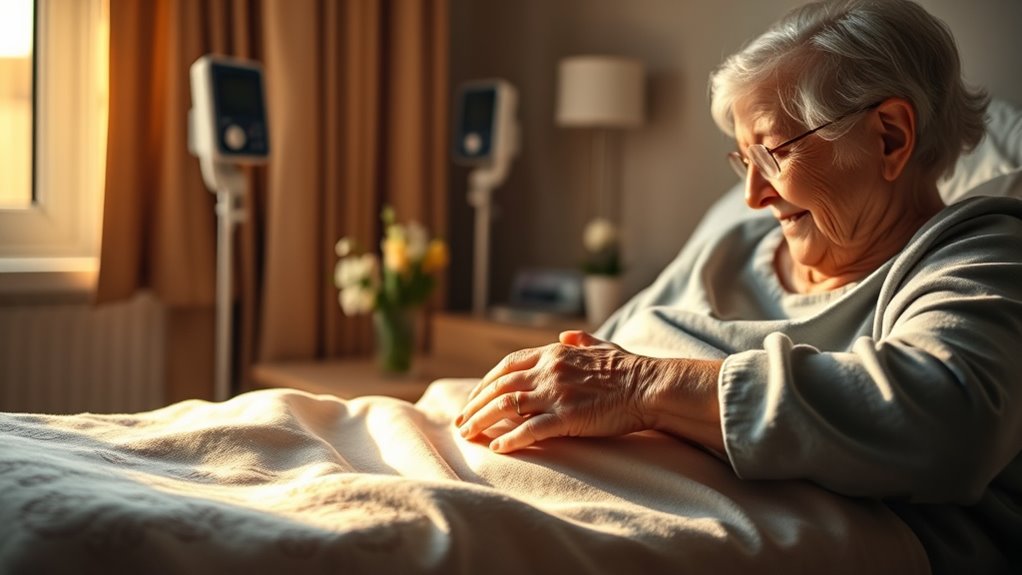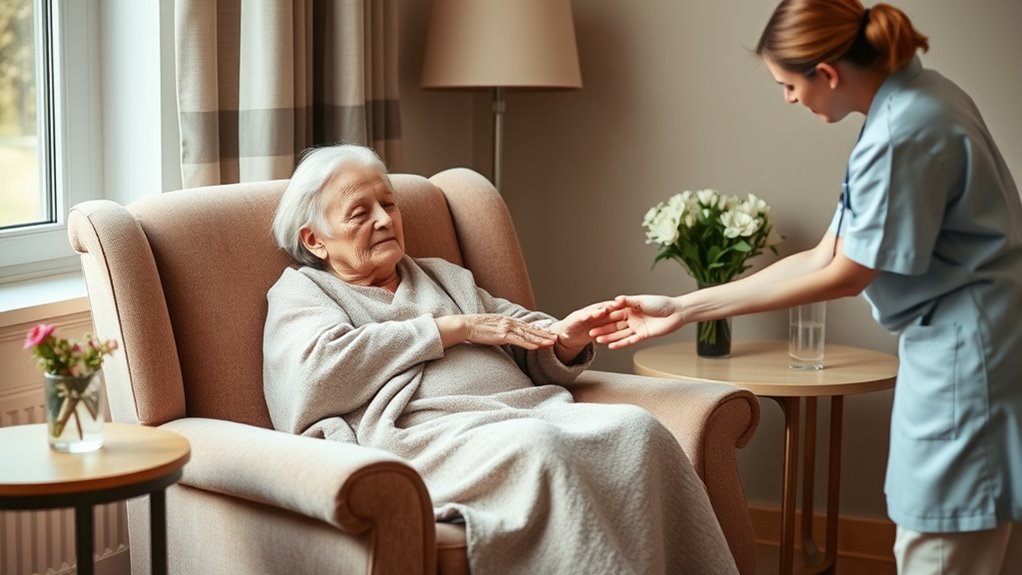To manage pain and comfort at the end of life, focus on a holistic approach that combines effective medication with emotional and spiritual support. Address physical discomfort through pain management, while also encouraging open conversations about feelings, fears, and spiritual needs. Providing reassurance, reflection, and connection helps ease emotional and spiritual burdens. If you want to explore strategies that promote overall peace and well-being, you’ll find more insights on creating a compassionate care plan.
Key Takeaways
- Use appropriate pain medications tailored to individual needs to effectively manage physical discomfort.
- Incorporate emotional support through open communication to reduce anxiety and promote a sense of control.
- Provide spiritual care activities, such as rituals or reflection, to foster inner peace and emotional resilience.
- Adopt a holistic approach that integrates physical, emotional, and spiritual care for comprehensive comfort.
- Engage multidisciplinary teams, including caregivers, counselors, and spiritual guides, to address all aspects of well-being.

Managing pain and comfort at the end of life is essential to ensuring dignity and quality of remaining days. When you’re facing this stage, addressing physical discomfort is just one part of the equation. Equally important is providing psychological support and spiritual care, which can profoundly influence your overall well-being. These aspects help you find meaning, peace, and emotional stability amid physical challenges.
Psychological support involves understanding your fears, anxieties, and emotional struggles. It’s *indispensable* that you feel heard and supported by caregivers, loved ones, or mental health professionals. Open conversations about your feelings help reduce anxiety and foster a sense of control. You might find comfort in counseling or support groups where shared experiences create a sense of community. Knowing that your emotional needs are acknowledged can *considerably* ease the burden of end-of-life care, enabling you to focus on peaceful acceptance and remaining connections.
Feeling heard and supported eases end-of-life anxiety and promotes peaceful acceptance.
Spiritual care plays a *pivotal* role in helping you find inner peace. Regardless of your faith or beliefs, spiritual support can provide comfort through rituals, prayer, or simply moments of reflection. Spiritual care providers or chaplains are trained to listen to your spiritual questions, doubts, or hopes. They help you explore what gives your life meaning and assist in resolving spiritual conflicts or unresolved issues. This support often provides reassurance, helping you reconcile feelings of fear or despair with a sense of purpose or transcendence.
Integrating psychological and spiritual support into your care plan requires a personalized approach. You should feel empowered to express your needs and preferences openly. Care teams that prioritize holistic care recognize that addressing emotional and spiritual well-being enhances physical comfort. For example, managing pain with medication is *crucial*, but when combined with emotional reassurance and spiritual solace, it becomes part of a *well-rounded* comfort strategy. Additionally, supportive resources such as counseling, spiritual guidance, and community groups can further enhance your overall sense of peace and connection.
Frequently Asked Questions
How Can Family Members Effectively Communicate Pain Concerns to Healthcare Providers?
You can effectively communicate pain concerns to healthcare providers by advocating for your loved one and addressing any communication barriers. Share specific details about their pain, including intensity and frequency, and observe their reactions. Keep a pain diary if needed. Be clear, assertive, and ask questions to guarantee your concerns are understood. Your active involvement helps providers tailor care, making sure your loved one’s comfort remains a priority.
What Are Alternative Therapies for Pain Management Besides Medication?
You can explore complementary therapies and holistic approaches like massage, acupuncture, or guided imagery to ease pain naturally. These methods work alongside traditional treatments, helping you find comfort without relying solely on medication. Many find that practices such as aromatherapy, meditation, or gentle yoga offer a soothing sense of peace. By incorporating these gentle options, you create a more personalized and calming experience during challenging times.
How Is Emotional or Spiritual Distress Addressed Alongside Physical Pain?
You can address emotional or spiritual distress by providing emotional support through active listening and empathy, helping the person express their feelings. Offering spiritual counseling can also be beneficial, guiding them through their beliefs and values. Encourage open conversations about fears or doubts, and involve chaplains or spiritual advisors if desired. This holistic approach helps ease emotional and spiritual pain, complementing physical comfort measures.
What Are the Potential Side Effects of Pain Medications in End-Of-Life Care?
You should be aware that pain medications, especially opioids, can cause side effects like nausea and the risk of opioid dependency. These medications might lead to constipation or drowsiness as well. It is crucial to monitor your response and communicate with healthcare providers to manage these effects effectively. Adjustments in dosage or alternative therapies can help minimize discomfort while providing relief.
How Do Cultural Beliefs Influence Pain Management Choices?
Cultural beliefs greatly influence your pain management choices by shaping how you perceive pain and treatment options. Cultural stigmas may lead you to avoid certain medications or therapies, fearing judgment or misunderstanding. Alternatively, you might prefer traditional healing practices that align with your cultural values. Understanding these influences helps healthcare providers tailor care, ensuring comfort while respecting your beliefs and preferences in end-of-life care.
Conclusion
As you navigate end-of-life care, remember that managing pain and comfort isn’t just about medication—it’s about dignity, empathy, and presence. While medicines can ease suffering, your compassion creates a sanctuary of peace. Striking this balance might be challenging, but it’s the heartfelt moments that truly define the journey. In the end, your efforts bring both relief and reassurance, proving that even in final moments, kindness remains the most powerful comfort you can offer.









